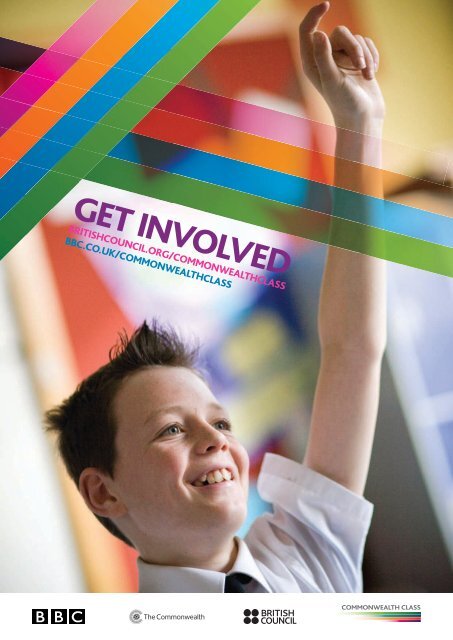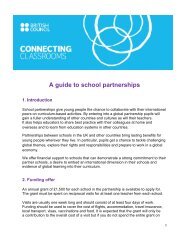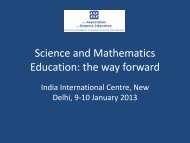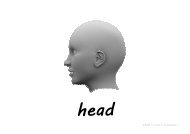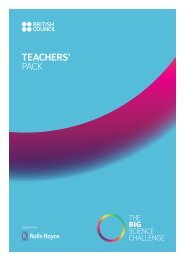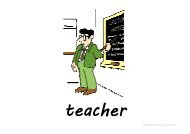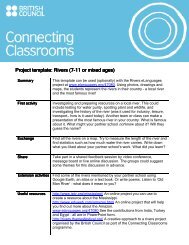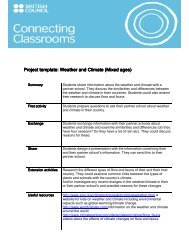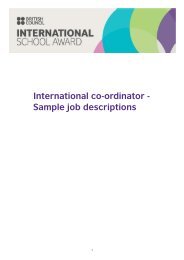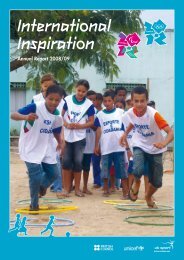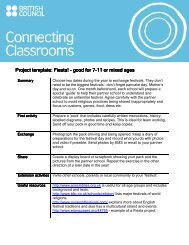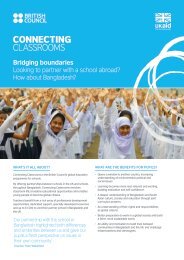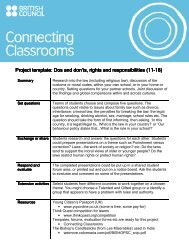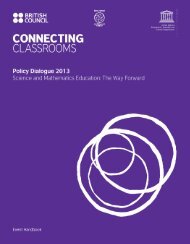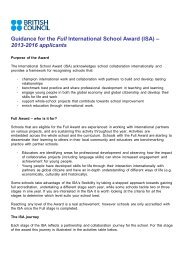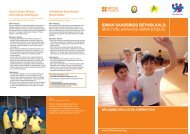Commonwealth Education Pack - British Council Schools Online
Commonwealth Education Pack - British Council Schools Online
Commonwealth Education Pack - British Council Schools Online
Create successful ePaper yourself
Turn your PDF publications into a flip-book with our unique Google optimized e-Paper software.
GET INVOLVED<br />
BRITISHCOUNCIL.ORG/COMMONWEALTHCLASS<br />
BBC.CO.UK/COMMONWEALTHCLASS
COMMONWEALTH GAMES EDUCATION PACK | 2013<br />
Introduction<br />
‘Young people are our source of hope and inspiration for<br />
the challenges of tomorrow. The future of our world as well<br />
as the future of the <strong>Commonwealth</strong> will be shaped by you.’<br />
Australian Prime Minister Julia Gillard at the launch of the<br />
<strong>Commonwealth</strong> Youth Forum in Fremantle, Australia<br />
This pack has been designed to support young<br />
people’s education about the world around<br />
them and to facilitate dialogue between<br />
teachers and young people across the globe,<br />
so that together they will come to have a<br />
deeper knowledge and understanding of the<br />
<strong>Commonwealth</strong> and its values, and be able to<br />
help shape it for the future.<br />
The activities can be used as starting<br />
points for individual lessons or as elements<br />
of larger cross-curricular joint projects<br />
involving collaboration over a number of<br />
subjects. They are aimed primarily at pupils<br />
aged 7–14, but could be adapted to suit<br />
younger or older audiences. They form part<br />
of the <strong>Commonwealth</strong> Class project produced<br />
by the BBC, the <strong>British</strong> <strong>Council</strong> and the<br />
<strong>Commonwealth</strong> Secretariat leading up to the<br />
<strong>Commonwealth</strong> Games in Glasgow 2014.<br />
They aim to develop knowledge and<br />
understanding, alongside important skills and<br />
competencies such as critical thinking,<br />
communication and creativity – essential for<br />
young people growing up as <strong>Commonwealth</strong><br />
and global citizens.<br />
ii
COMMONWEALTH GAMES EDUCATION PACK | 2013<br />
Contents<br />
The materials are designed to be flexible and<br />
adaptable for use in a variety of settings and<br />
include sections on:<br />
• Introducing the <strong>Commonwealth</strong> and<br />
<strong>Commonwealth</strong> Games<br />
• <strong>Commonwealth</strong> Class – Children of the<br />
<strong>Commonwealth</strong><br />
• I am a <strong>Commonwealth</strong> citizen<br />
• <strong>Online</strong> debates<br />
• Launching a <strong>Commonwealth</strong> event.<br />
Each unit contains background information,<br />
ideas for discussion, and cross-curricular<br />
activities. There are learning outcomes, lists<br />
of additional resources and links to curriculum<br />
subjects and <strong>Commonwealth</strong> values.<br />
We hope your school will join in the exciting<br />
opportunities leading up to Glasgow 2014.<br />
The possibilities are endless; the choices<br />
are yours.<br />
1
COMMONWEALTH GAMES EDUCATION PACK | 2013<br />
SECTION 1: INTRODUCING THE COMMONWEALTH<br />
The resources in this section encourage schools around the world to teach,<br />
think and talk about the <strong>Commonwealth</strong>, its values and the sports and athletes<br />
who will be participating in the <strong>Commonwealth</strong> Games.<br />
What is the <strong>Commonwealth</strong><br />
The <strong>Commonwealth</strong> is a voluntary association<br />
of 54 countries that support each other and<br />
work together in the common interests of their<br />
citizens for development, democracy and<br />
peace. It is home to two billion people of all<br />
faiths and ethnicities – over half of whom are<br />
25 or under. Member countries come from<br />
Africa, Asia, the Americas, the Caribbean,<br />
Europe and the South Pacific.<br />
In 2013, every country in the <strong>Commonwealth</strong><br />
signed a shared charter, or set of values.<br />
These include holding fair and free elections,<br />
respecting human rights and promoting<br />
tolerance, respect and understanding.<br />
The charter states: ‘We are implacably<br />
opposed to all forms of discrimination,<br />
whether rooted in gender, race, colour,<br />
creed, political belief or other grounds.’<br />
and the Isle of Man. As well as many Olympic<br />
sports, the Games also include sports that are<br />
widely played in <strong>Commonwealth</strong> countries,<br />
such as lawn bowls, rugby sevens and netball.<br />
In November 2006 the <strong>Commonwealth</strong> Games<br />
Federation agreed there should be ten core<br />
sports, with each bidding city able to select<br />
up to a further seven sports, plus a number<br />
of Para-Sports for athletes with a disability.<br />
Glasgow 2014 will see the introduction of the<br />
biggest-ever number of Para-Sports medal<br />
events in <strong>Commonwealth</strong> Games history.<br />
To discover more go to the Game on Scotland<br />
website at www.gameonscotland.org/<br />
The design for the <strong>Commonwealth</strong> flag and<br />
logo incorporates an image of the globe.<br />
The spears that make up the letter C<br />
symbolise the many facets of <strong>Commonwealth</strong><br />
co-operation around the world.<br />
The <strong>Commonwealth</strong> Games are known as<br />
‘the friendly Games.’ The event was first held<br />
in 1930 and is an international, multi-sport<br />
event that takes place every four years.<br />
Seventy one nations and territories will be<br />
represented at the games, as some countries<br />
like the UK are made up of a number of<br />
territories or dependencies such as Jersey<br />
2
COMMONWEALTH GAMES EDUCATION PACK | 2013<br />
Discussion points and activities<br />
A. Guess Who…<br />
Age range: 7–14 years<br />
<strong>Commonwealth</strong> values: tolerance, respect and understanding<br />
Curriculum links: Geography, Global Citizenship/English<br />
Key skills: critical thinking, discussion and debate<br />
Learning outcomes: to introduce information about the countries of the <strong>Commonwealth</strong>,<br />
and provide a baseline of pupils’ initial knowledge and understanding.<br />
A number of these activities are adapted from<br />
the Royal <strong>Commonwealth</strong> Society education<br />
resources called Getting to Know Your<br />
<strong>Commonwealth</strong> (you can find more at<br />
www.thercs.org/youth/). Show the Guess Who<br />
PowerPoint presentation at www.thercs.org/<br />
youth/Filestore/PDFDownloads/Teaching_<br />
Resources/1r1_<strong>Commonwealth</strong>_Guess_Who_<br />
presentation.pdf, pausing between slides.<br />
Ask your pupils to try to identify the countries<br />
and guess the connection between them.<br />
Each answer appears on the next slide. If you<br />
want the task to be a little more competitive,<br />
you could divide the class into teams and<br />
score them on correct answers. If pupils are<br />
not able to identify the countries, try giving<br />
some additional clues.<br />
Once you have gone through the slides and<br />
identified the <strong>Commonwealth</strong> connection,<br />
ask students to describe to a partner how<br />
they would reply to the question ‘What is the<br />
<strong>Commonwealth</strong>’ Record class responses as<br />
a baseline to capture their initial knowledge.<br />
Return to these at the end of the project to<br />
see how much they have learnt.<br />
Use slide 15 to briefly explain the history<br />
and current work of the <strong>Commonwealth</strong>,<br />
including the signing of the <strong>Commonwealth</strong><br />
Charter in 2013.<br />
3
COMMONWEALTH GAMES EDUCATION PACK | 2013<br />
B. Down the Line<br />
Age range: 11–14 years<br />
<strong>Commonwealth</strong> values: tolerance, respect and understanding<br />
Curriculum links: English, Global Citizenship<br />
Key skills: communication, expressing an opinion, co-operation, reflection<br />
Learning outcomes: to demonstrate understanding and express opinions about issues<br />
related to the <strong>Commonwealth</strong>.<br />
Move classroom furniture or work outside<br />
so that you have a large space in which pupils<br />
can move around. Use masking tape or chalk<br />
to create a line running across the space with<br />
a sign saying ‘Strongly agree’ at one end and<br />
‘Strongly disagree’ at the other.<br />
Read out one of the statements from the list<br />
below and ask the pupils to move to a point on<br />
the line that best represents their opinion on<br />
the statement.<br />
• Today is the first time I have ever heard<br />
of the <strong>Commonwealth</strong>.<br />
• I think the <strong>Commonwealth</strong> should do more<br />
to advertise what it does for young people.<br />
• I can name three member nations of the<br />
<strong>Commonwealth</strong>.<br />
• There are more differences between people<br />
around the <strong>Commonwealth</strong> than similarities.<br />
• It is good that my country is part of the<br />
<strong>Commonwealth</strong>.<br />
• I feel the <strong>Commonwealth</strong> is not relevant<br />
to my life.<br />
• It is a good thing that there is so much<br />
diversity across the <strong>Commonwealth</strong>.<br />
• It is important that the <strong>Commonwealth</strong><br />
stands up for equal rights for girls<br />
and women.<br />
• I think the <strong>Commonwealth</strong> should<br />
concentrate on sustainability to protect<br />
the environment for future generations.<br />
Once pupils have stopped moving, you could<br />
ask one or more of them to explain why they<br />
have chosen their position. Give them a chance<br />
to change their minds and move down the<br />
line if they are convinced by other students’<br />
ideas. Repeat the activity for other statements<br />
and add some statements of your own.<br />
Ask different pupils to explain their opinions<br />
each time.<br />
Talk with pupils about the flexibility of their<br />
opinions – even if they form an opinion today,<br />
with more information, further discussion and<br />
changing circumstances it is fine to change<br />
opinion and that this is an important part of<br />
being an astute, open-minded individual.<br />
4
COMMONWEALTH GAMES EDUCATION PACK | 2013<br />
C. The Queen’s Baton Relay<br />
Age range: 7–14 years<br />
<strong>Commonwealth</strong> values: valuing the importance and contributions of young people across<br />
the <strong>Commonwealth</strong>, tolerance, respect and understanding<br />
Curriculum links: Geography, English, Design and Technology<br />
Key skills: research, creativity, communication skills<br />
Learning outcomes: to find out about the Queen’s Baton Relay and trace its route.<br />
To learn more about the countries that it passes through and stories of some of the<br />
young runners taking part.<br />
Launched from Buckingham Palace on<br />
9 October 2013, this international relay aims<br />
to demonstrate the unity and diversity of<br />
the <strong>Commonwealth</strong>. The baton will travel<br />
more than 190,000 kilometres through Asia,<br />
Oceania, Africa, the Americas (south), the<br />
Caribbean, and Americas (north) before<br />
returning to Europe and making its way to<br />
Glasgow for the opening ceremony of the<br />
<strong>Commonwealth</strong> Games.<br />
Throughout the <strong>Commonwealth</strong>, thousands<br />
of people will run the relay with the baton.<br />
Talk about the relay and encourage your pupils<br />
to follow its journey on a map or using online<br />
resources (technology permitting). Keep a<br />
record or blog of any interesting stories that<br />
occur, particularly about the young runners<br />
on its progress.<br />
Traditionally the baton carries a hidden message<br />
from the Queen to the <strong>Commonwealth</strong>. The final<br />
relay runner hands the baton back to the Queen<br />
at the opening ceremony. She then reads<br />
aloud the message and officially declares<br />
the Games open.<br />
Can your pupils design and make their own<br />
special relay baton. It will need to be sturdy,<br />
as unlike the Olympic torch there is only one<br />
baton and it may well be dropped on the way!<br />
What do your pupils think the hidden message<br />
should say<br />
Ask the children to work in groups, choose a<br />
<strong>Commonwealth</strong> country that the baton will<br />
pass through and carry out some research<br />
about their chosen country. They could<br />
explore the climate, flora and fauna, the<br />
capital city, languages spoken, and find out<br />
about athletes who will be competing for<br />
their country during the <strong>Commonwealth</strong><br />
Games. Encourage pupils to use geographical<br />
vocabulary, a variety of sources for their<br />
investigations and to present their information<br />
in interesting and innovative ways – creating<br />
a wiki page or poster, making a slideshow<br />
presentation or short film plus perhaps<br />
selecting an object that illustrates an<br />
aspect of the country.<br />
Discuss with them the dangers of stereotyping,<br />
to ensure that they do not start to think<br />
that what they have found in their research<br />
represents the viewpoints of all the people<br />
in the country concerned.<br />
Suggestions for further development<br />
They could share their results with each<br />
other and parents by teaching a lesson about<br />
their country of choice and preparing food<br />
and music from their chosen countries.<br />
Tell each group that they will be marked on<br />
the clarity of the information and the<br />
innovative ways in which it is taught.<br />
After their sessions, discuss what they<br />
learnt, and what they found challenging when<br />
preparing and teaching their lessons.<br />
5
COMMONWEALTH GAMES EDUCATION PACK | 2013<br />
D. Fun with Flags and Traditional Tales!<br />
Age range: 7–14 years<br />
<strong>Commonwealth</strong> values: valuing the importance and contributions of young people across<br />
the <strong>Commonwealth</strong>, tolerance, respect and understanding<br />
Curriculum links: English, Art and Design, Drama, Global Citizenship<br />
Key skills: research, creativity, co-operation<br />
Learning outcomes: to become more familiar with the flags, symbols and stories from<br />
<strong>Commonwealth</strong> countries. To create their own <strong>Commonwealth</strong> flag and illustrations, and to<br />
take part in a performance of traditional tales.<br />
Every country in the <strong>Commonwealth</strong> has<br />
a unique flag for its national symbol.<br />
Pupils will become very familiar with some<br />
of these during the medal ceremonies<br />
of the <strong>Commonwealth</strong> Games.<br />
Show the class the <strong>Commonwealth</strong> flag and<br />
logo below.<br />
Show your pupils the sheet with flags<br />
from <strong>Commonwealth</strong> countries here or<br />
at Appendix 2. www.thercs.org/youth/<br />
Filestore/PDFDownloads/Teaching_<br />
Resources/<strong>Commonwealth</strong>_Flags_Poster.pdf<br />
How many do they know Can they work<br />
together to identify all the flags on the sheet<br />
and find out why specific colours and images<br />
are used on certain flags On the Bahamas<br />
flag, for example, the yellow stripe represents<br />
the sandy beaches of the 700 Bahamian<br />
islands, the blue represents the water and<br />
the black triangle represents the Bahamian<br />
people along with their desire to develop the<br />
land and the sea. On the flag of Bangladesh,<br />
the green symbolises the green topography<br />
and youthfulness of the republic, while the red<br />
symbolises the rising sun and the sacrifices<br />
its citizens have made.<br />
Discuss what they think the image represents.<br />
If they were to design a new flag or logo for the<br />
<strong>Commonwealth</strong> or the <strong>Commonwealth</strong> Games<br />
in Glasgow 2014, what would they include<br />
6
COMMONWEALTH GAMES EDUCATION PACK | 2013<br />
Patterns and Rhythms – Every Drop Counts<br />
Age range: 7–14 years<br />
<strong>Commonwealth</strong> values: sustainable development and protecting the environment, valuing<br />
the importance and contributions of young people across the <strong>Commonwealth</strong><br />
Curriculum links: Science, Social Science, English, Art and Design, Drama<br />
Key skills: creativity, co-operation, critical thinking<br />
Learning outcomes: to increase knowledge and understanding of stories and poems from<br />
<strong>Commonwealth</strong> countries and issues related to sustainability and water conservation.<br />
Every <strong>Commonwealth</strong> country has a rich<br />
heritage of storytelling. The following activities<br />
are adapted from A River of Stories <strong>Education</strong>al<br />
Resource produced by Learning Media<br />
for The <strong>Commonwealth</strong> <strong>Education</strong> Trust<br />
(www.ariverofstories.com) ©Jan Pieńkowski.<br />
Patterns and Rhythms<br />
Water is found in many forms and in many<br />
different places, and it is vital to preserve this<br />
precious resource. Discuss with your pupils<br />
how water appears in different forms and how<br />
there are often patterns or rhythms in the way<br />
it appears. For example,<br />
• the ocean’s tides go in and out in a regular<br />
pattern, in some places once a day and in<br />
others twice a day<br />
• in some tropical countries, rain falls every<br />
afternoon during some months<br />
• in summer, polar ice melts and in winter<br />
it freezes again.<br />
Can your pupils add to these examples<br />
Read aloud the folktale from Fiji, Cooking<br />
with Salt Water, retold by Pleasant de Spain,<br />
which is taken from A River of Stories: Tales<br />
and Poems from across the <strong>Commonwealth</strong><br />
(www.ariverofstories.com), ©Jan Pieńkowski.<br />
You can find the folktale at Appendix 1.<br />
Ask your pupils which water pattern forms<br />
the basis for the main theme of the story<br />
(the tides). The tides are caused by the<br />
gravitational attraction between the earth<br />
and the moon.<br />
In this story, Amara doesn’t understand that<br />
the tide goes in and out each day. Ask your<br />
pupils to write an explanation telling Amara<br />
why the sea gets bigger and smaller. They can<br />
choose to write a factual explanation or write<br />
their own folktale that describes a tug of war<br />
between the moon and Chief Sea (When the<br />
tide goes out, Amara thinks Chief Sea is angry<br />
that she has taken some of his water.) Ask your<br />
pupils to write a short story about something<br />
else Chief Sea might be angry about, for<br />
example, people putting rubbish in the ocean<br />
or oil pollution. Your pupils should clearly state<br />
how these actions have upset the patterns and<br />
rhythms of nature.<br />
Ask your pupils to choose one of the forms of<br />
water they have discussed and represent the<br />
pattern or rhythm as a collage.<br />
Every Drop Counts<br />
Show the pupils a picture of a dripping tap.<br />
Discuss what is happening in the picture.<br />
Why is it a problem Tell them that a tap that<br />
drips once every ten seconds will waste<br />
about 315 litres of water in a year – that is<br />
about two large bathtubs full of water.<br />
• Have you ever seen a tap dripping, perhaps<br />
at your house or school<br />
• Whose responsibility is it to fix it<br />
• What would happen if nobody took any<br />
notice of things like this<br />
7
COMMONWEALTH GAMES EDUCATION PACK | 2013<br />
In small groups, ask pupils to discuss the ways<br />
in which they use water each day and how they<br />
could change their water usage so they don’t<br />
waste it.<br />
Read aloud the poem from Botswana, Woman’s<br />
World, by Barolong Seboni (you will find the<br />
poem at Appendix 2), and show pupils the<br />
layout of the poem on the page. In parts of the<br />
world where people cannot turn on a tap to<br />
get fresh water, they may have to collect water<br />
each day and then walk a long way home.<br />
For these people, every drop counts.<br />
The shape of the poem Woman’s World is like<br />
the zigzag path the women have to walk up the<br />
hill to collect water. It is saying that collecting<br />
water like this is hard work. Ask pupils to write<br />
their own shape poem, based on the idea that<br />
every drop counts. They should use a shape<br />
that matches the message of the poem.<br />
For example, if they are talking about dripping<br />
taps, their poem could be in the shape of a<br />
water droplet.<br />
Many groups have specific cultural practices<br />
relating to the use of resources such as fresh<br />
water. Students could choose a practice from<br />
their area, or from a local cultural group,<br />
and explain how the practice shows the<br />
guardianship of the resource.<br />
Suggestions for further development<br />
Ask your pupils to put on a display of readings<br />
or dramatised performances of other<br />
traditional tales and poems for younger pupils<br />
and parents. Pupils could also learn songs<br />
from <strong>Commonwealth</strong> countries such as India<br />
and Scotland from the World Voice website.<br />
http://schoolsonline.britishcouncil.org/<br />
projects-and-resources/world-voice<br />
8
COMMONWEALTH GAMES EDUCATION PACK | 2013<br />
E. <strong>Commonwealth</strong> Games and Athletes<br />
Age range: 7–16 years<br />
<strong>Commonwealth</strong> values: rule of law, equality<br />
Curriculum links: English, Physical <strong>Education</strong><br />
Key skills: research, discussion and debate<br />
Learning outcomes: to find out about some of the sports and athletes competing at the<br />
Games; to practise the skills needed to participate effectively in online debates.<br />
The 2014 <strong>Commonwealth</strong> Games take<br />
place in Glasgow from 23 July to 3 August.<br />
In the words of Lord Coe (Chair of the<br />
London Organising Committee for the<br />
Olympic Games in 2012), ‘The <strong>Commonwealth</strong><br />
Games is an extraordinary event. It has a spirit<br />
and a humanity that’s rarely witnessed in any<br />
championship.’<br />
Ask students to investigate the rules and<br />
procedures of some of the 17 sports that<br />
will feature in the 20th Games. They can find<br />
more information at www.gameonscotland.<br />
org/glasgow2014/events/index.asp<br />
Suggestions for further development<br />
Ask pupils to research traditional games that<br />
were played by parents or grandparents or that<br />
were common in their local community in the<br />
past. Get students to write some instructions<br />
and rules, or perhaps make a short film to teach<br />
these games to other pupils in school.<br />
<strong>Commonwealth</strong> Athletes –<br />
The Fastest Man on the Planet<br />
Discuss with your pupils why rules are needed if<br />
sports and games are to be fair. Is it ever ok to<br />
break these rules How can the sports ensure<br />
that the rules are followed and play is fair<br />
The <strong>Commonwealth</strong> Games include disability<br />
events, rather than holding a separate games<br />
as happens at the Olympics. Invite pupils<br />
to discuss this arrangement. Do they think<br />
that full integration would be a positive way<br />
forward for other events like the Olympic<br />
Games or do they think that the Paralympics<br />
should be kept as a separate event<br />
Many <strong>Commonwealth</strong> countries have their<br />
own traditional games. Information on<br />
how to play some of these can be found<br />
at www.london2012.com/mm/Document/<br />
Documents/Publications/01/25/38/67/<br />
london2012-completegames_Neutral.pdf<br />
Encourage pupils to try playing some of<br />
the games that originate in <strong>Commonwealth</strong><br />
countries, such as Daria Bandha – a traditional<br />
tagging game from Bangladesh, or Mundo –<br />
a hopping game from Mozambique.<br />
Which games did pupils find the easiest and<br />
most difficult to play<br />
Game On Scotland website: www.gameonscotland.org/<br />
glasgow2014/events/index.asp<br />
Ask pupils what they think they would need to<br />
do to become the fastest runner in the world<br />
Usain Bolt knows what it takes, because he<br />
holds the world record for running 100 metres<br />
in 9.58 seconds – that is faster than most<br />
cars! Ask pupils to investigate what they can<br />
achieve in 9.58 seconds. How far can they run<br />
How many times can they catch a ball or write<br />
their name How long does it take them to run<br />
100 metres<br />
Usain was brought up in Jamaica and is<br />
likely to be one of the stars of Glasgow 2014.<br />
He went to an ordinary school and trained<br />
on the school’s dusty playing field. He did not<br />
have lots of hi-tech equipment but he did<br />
9
COMMONWEALTH GAMES EDUCATION PACK | 2013<br />
have talent, dedication and people that cared<br />
about him. As well as running, he loved playing<br />
cricket and wanted to be a cricketer when he<br />
was young. One of his teachers spotted his<br />
athletics talent and persuaded him to focus<br />
on running.<br />
Watch the short film here. www.bbc.co.uk/<br />
worldclass/15722515 or on the DVD about<br />
Usain’s school in Jamaica to see how his<br />
teacher helped him become the world’s fastest<br />
man and win three gold medals at the Olympic<br />
Games in London 2012.<br />
In the film we see how important Usain’s<br />
teacher Laura Thorpe was in helping him<br />
to achieve his dreams. Discuss with your<br />
pupils how she makes a difference to the<br />
pupils she teaches. Ask pupils if they can<br />
remember a really inspiring lesson and<br />
what made it special.<br />
Explain that this will be useful preparation<br />
for taking part in the <strong>Commonwealth</strong> Class<br />
worldwide debates.<br />
Suggestions for further development<br />
Carry out some of the activities in the Game<br />
On Scotland Learning Journey ‘What Makes a<br />
Successful Athlete’ www.gameonscotland.<br />
org/resources/learningjourneywhatmakes<br />
asuccessfulathlete.asp<br />
This learning journey focuses on which<br />
countries have been most successful in the<br />
<strong>Commonwealth</strong> Games and explores reasons<br />
for this in the context of numeracy and<br />
mathematics.<br />
Invite pupils to discuss the sporting idols that<br />
they admire. What qualities and skills do they<br />
think very successful athletes need to make it<br />
to the top of their sport<br />
Set up a classroom debate to discuss the<br />
following question:<br />
What do you think is a more important<br />
factor in training successful sports<br />
stars: hi-tech equipment or an<br />
inspirational teacher<br />
During the debate, encourage your pupils<br />
to think about what others are saying.<br />
Do they agree or disagree Do they have a<br />
counterpoint or follow-up Encourage the use<br />
of phrases such as ‘To expand on Rebecca’s<br />
point, I think…’ or ‘To counter that argument<br />
you could say…’<br />
10
COMMONWEALTH GAMES EDUCATION PACK | 2013<br />
SECTION 2: COMMONWEALTH CLASS – CHILDREN OF THE COMMONWEALTH<br />
Watch the following films online or on the DVD with your pupils<br />
to find out about the lives of children from different countries<br />
of the <strong>Commonwealth</strong>. Each film presents engaging and topical<br />
stories told through the eyes of the children, and demonstrates<br />
particular <strong>Commonwealth</strong> Charter principles and values.<br />
A. Oli’s Child Marriage Crusade<br />
– a film from Bangladesh<br />
www.bbc.co.uk/worldclass/20045275<br />
Oli is a 12-year-old boy from Bangladesh who is<br />
campaigning against child marriage.<br />
Bangladesh has one of the highest rates of<br />
child marriage in the world with 20 per cent<br />
of girls becoming wives before their 15th<br />
birthday, even though the law says that they<br />
should not get married before the age of 18.<br />
Oli became fed-up of seeing his friends<br />
dropping out of school and decided to do<br />
something about it. He and his friends try to<br />
talk to their elders in the local area about why<br />
they shouldn’t marry off their daughters so<br />
young. They have already halved the number<br />
of child marriages in the local area.<br />
BBC website: www.bbc.co.uk/worldclass/20045275<br />
Age range: 10–16 years<br />
<strong>Commonwealth</strong> values: universal human rights, gender equality, valuing the importance<br />
and contributions of young people across the <strong>Commonwealth</strong><br />
Curriculum links: Geography, Global Citizenship, English, Drama<br />
Key skills: active citizenship, collaboration, communication<br />
Learning outcomes: to learn about the lives of a group of children in Bangladesh and the<br />
positive contribution they are making to the community; to investigate ways in which young<br />
people can make a positive difference to their community.<br />
11
COMMONWEALTH GAMES EDUCATION PACK | 2013<br />
Oli lives in Dhaka, the capital city of<br />
Bangladesh. Use a range of maps, globes or<br />
satellite images to enable your pupils to locate<br />
Dhaka and Bangladesh. What can they find out<br />
about the physical and human characteristics<br />
of the country How far is it from their home<br />
Which direction would they travel to get<br />
there and which countries would they have<br />
to pass through<br />
Although he is only 12-years old, Oli and<br />
his friends have achieved amazing results.<br />
By talking with the elders in the village,<br />
explaining why they shouldn’t marry off<br />
their daughters at such a young age and<br />
highlighting the benefits to the children of<br />
staying in school, they have halved the<br />
number of child marriages in their locality.<br />
Explore the issues raised in the film with<br />
your pupils and how Oli and his friends must<br />
feel when they tackle adults about such<br />
challenging and difficult issues. Would they<br />
be nervous What would they say<br />
In the first Harry Potter book, by JK Rowling,<br />
one character says ‘There are all kinds of<br />
courage ... It takes a great deal of bravery<br />
to stand up to our enemies, but just as much<br />
to stand up to our friends.’ Explore what this<br />
statement means with your pupils. Have they<br />
ever encountered situations where they had<br />
to stand up to friends or adults if they thought<br />
something was wrong How did they feel<br />
Help the children to find other real-life<br />
and fictional stories of children who have<br />
championed children’s rights or showed<br />
courage in difficult situations.<br />
Ask your pupils to devise scenarios in which<br />
a character has to stand up to friends or adults<br />
to prevent something happening that they<br />
believe is wrong. Use forum theatre techniques*<br />
so that members of the group can stop the<br />
action if and when they think it necessary, and<br />
suggest characters in the drama take different<br />
actions or say different things.<br />
In the year 2000, over 180 countries signed up<br />
to the Millennium Development Goals to make<br />
the world a better place by 2015. Ask your<br />
students to find out more about these goals,<br />
the progress that has been made towards<br />
them and the UN Convention on the Rights<br />
of the Child (CRC), which was ratified by<br />
all governments in the <strong>Commonwealth</strong>.<br />
These rights are based on what a child needs<br />
to survive, grow, participate and fulfil their<br />
potential. They apply to every child, regardless<br />
of who they are or where they are from.<br />
Ask your students how these goals fit with<br />
the <strong>Commonwealth</strong> Charter signed in 2013<br />
Get pupils to devise a poster or film campaign<br />
to raise awareness of the values and principles<br />
contained within the <strong>Commonwealth</strong> Charter<br />
and debate the following statement from it:<br />
The advancement of women’s rights<br />
and the education of girls are critical<br />
for effective and sustainable<br />
development.<br />
*Forum theatre is a drama technique where actors<br />
or audience members can stop a performance and<br />
suggest different actions for the actors to carry<br />
out on-stage.<br />
Explore the work of organisations and<br />
movements such as Design for Change or<br />
Send my Friend to School, which encourage<br />
children and young people to express their<br />
own ideas for a better world and put them<br />
into action. Watch or read some of the case<br />
studies on the websites, which show young<br />
people devising and leading innovative ideas<br />
for change in countries all over the world.<br />
In India, for example, schemes range from<br />
developing literacy programmes to closing<br />
the streets to traffic on certain days to allow<br />
children to play. In one example from the UK,<br />
an infant school campaigned to reduce<br />
rubbish in their local park.<br />
Involve your students in designing and<br />
undertaking a real project to make<br />
an improvement to their local area.<br />
Discuss their ideas, choose one, find out<br />
what they will need to do and make it<br />
happen. Keep a blog of their progress and<br />
swap stories, challenges and the results with<br />
your partner school if you have one.<br />
12
COMMONWEALTH GAMES EDUCATION PACK | 2013<br />
School Journeys: Barefoot – a film from Kenya<br />
www.bbc.co.uk/worldclass/15409675<br />
Age range: 7–14 years<br />
<strong>Commonwealth</strong> values: access to education, tolerance, respect and understanding<br />
Curriculum links: Geography, Health and Wellbeing, Maths, Global Citizenship<br />
Key skills: research, communication<br />
Learning outcomes: to learn about the lives of young people attending school in<br />
rural Kenya; to discuss the hopes and dreams of young people in different parts<br />
of the <strong>Commonwealth</strong>.<br />
How do your pupils get to school Perhaps<br />
they travel by bus, bike or boat or maybe they<br />
walk to school. In the foothills of Mount Elgon<br />
in Kenya, the children walk to school and they<br />
walk barefoot.<br />
The roads are made of earth and rocks, and<br />
during the rainy season these turn into giant,<br />
muddy slides which makes getting to school<br />
really tricky. The area is famous for producing<br />
some of the best distance runners in the<br />
world. The high altitude means there’s less<br />
oxygen in the air, making it harder to breathe<br />
and run.<br />
The children get used to training in these<br />
conditions, and become extra resilient.<br />
This gives them an advantage when racing<br />
against others at lower altitude.<br />
BBC website: www.bbc.co.uk/worldclass/15409675<br />
13
COMMONWEALTH GAMES EDUCATION PACK | 2013<br />
In the film, Isabel talks about her morning<br />
routine of getting up at 5.00, walking or<br />
running to school in bare feet and cooking<br />
for her family. Talk about your pupils’ morning<br />
routines and their journeys to school.<br />
How many walk to school Compare and<br />
contrast their stories with those of the<br />
Kenyan children at Bishop Okiring School<br />
Use an atlas, maps, globes or satellite images<br />
to locate Mount Elgon in Kenya. What can<br />
your pupils find out about the location,<br />
physical features and climate in this part<br />
of the <strong>Commonwealth</strong><br />
Some of the children in the film walk and run<br />
up to 15 kilometres to school every day with<br />
bare feet. Chart a journey of an equivalent<br />
distance from your school. How would your<br />
pupils feel doing this every day in all weathers<br />
without shoes<br />
What are your pupils’ hopes and dreams<br />
for the future What do they think they will<br />
need to learn in order to achieve them<br />
Perhaps they could exchange their ideas with<br />
their partner school if they have one, or write<br />
their ambitions and hopes for the future on<br />
balloons and release them on a sunny day.<br />
Can they find out more about Kenyan athletes<br />
who will be competing in the <strong>Commonwealth</strong><br />
Games and follow their progress Do any<br />
come from the area where Isabel and Dixon<br />
go to school<br />
Set up a class debate to discuss the following<br />
questions:<br />
How safe is your journey to school<br />
Do you think more children should be<br />
encouraged to walk to school<br />
The Kenyan children talk about their ambitions.<br />
Dixon tells us, ‘I run to school as I want to try<br />
my luck in athletics.’ Isabel is also on a mission:<br />
‘What I’m hoping for is to become a journalist so<br />
I can highlight people’s problems and improve<br />
the condition of the roads around here.’<br />
14
COMMONWEALTH GAMES EDUCATION PACK | 2013<br />
Letters from the <strong>Commonwealth</strong><br />
Age range: 11–14 years<br />
<strong>Commonwealth</strong> values: tolerance, respect and understanding<br />
Curriculum links: English, Global Citizenship<br />
Key skills: communication, co-operation, comprehension<br />
Learning outcomes: to find out more about children’s lives in <strong>Commonwealth</strong> countries.<br />
Encourage pupils to find out more about<br />
children’s lives across the <strong>Commonwealth</strong> by<br />
reading the letters written by young pupils at<br />
schools in <strong>Commonwealth</strong> countries, detailing<br />
what their lives are like. www.thercs.org/<br />
youth/Filestore/<strong>Online</strong>_Materials/Green%20<br />
Lesson-1.pdf<br />
See pages 16–19 .<br />
If they could ask their letter-writer one<br />
question, what would it be What would<br />
they tell them about their own lives<br />
Divide the class into groups and give out<br />
one letter to each group of pupils. Ask them<br />
to discuss the similarities and differences<br />
between their lives and those of the<br />
letter-writers and to feed back to the rest<br />
of the class the most interesting or surprising<br />
pieces of information they discover.<br />
Emphasise that these narratives are not<br />
representative of all the people in that country,<br />
just as their own lives will be different<br />
from those of their peers and those of others<br />
around their home country or region.<br />
15
COMMONWEALTH GAMES EDUCATION PACK | 2013<br />
SECTION 3: ACTIVITIES TO ENCOURAGE COMMONWEALTH CITIZENSHIP<br />
Today, global links are part of our everyday<br />
lives. The Oxfam <strong>Education</strong> for Global<br />
Citizenship points out that we are linked<br />
to others around the world every day:<br />
• socially, through media and<br />
telecommunications<br />
• culturally, through the movements<br />
of people<br />
• economically, through trade<br />
• environmentally by sharing one planet<br />
• politically, through international<br />
relations and systems of regulation.<br />
<strong>Education</strong> for global and <strong>Commonwealth</strong><br />
citizenship is essentially about equipping<br />
young people for the world they will live in<br />
as adults. We don’t know for sure what the<br />
world will be like in the future but we can<br />
have aspirations and use our expertise to<br />
help young people to acquire the necessary<br />
outlooks, understandings and skills to realise<br />
these hopes.<br />
Around the World<br />
Age range: 9–14 years<br />
<strong>Commonwealth</strong> values: tolerance, respect and understanding<br />
Curriculum links: Geography, English, Global Citizenship<br />
Key skills: communication, co-operation<br />
Learning outcomes: to increase knowledge and understanding of <strong>Commonwealth</strong><br />
countries and global links.<br />
Enhance your pupils’ knowledge of the world<br />
and understanding of global links by playing<br />
games with an inflatable globe, passing it<br />
around the class and asking questions such as:<br />
• What countries do you or your families have<br />
links to Can you find them on the globe<br />
• What countries have you visited Where<br />
would you like to go and why<br />
• Can you find a <strong>Commonwealth</strong> country<br />
beginning with B An ocean beginning<br />
with I<br />
• Can you find Namibia and Tanzania<br />
Which hemisphere are they in and which<br />
direction would you travel from your home<br />
to get there<br />
Encourage pupils to ask their own questions<br />
and develop and use appropriate geographical<br />
vocabulary.<br />
16
COMMONWEALTH GAMES EDUCATION PACK | 2013<br />
I’m a <strong>Commonwealth</strong> Citizen<br />
Age range: 9–14 years<br />
<strong>Commonwealth</strong> values: tolerance, respect and understanding<br />
Curriculum links: English, Geography, Global Citizenship<br />
Key skills: communication, co-operation<br />
Learning outcomes: to investigate and demonstrate skills and outlooks of global and<br />
<strong>Commonwealth</strong> citizenship.<br />
Discuss with your pupils what they think the<br />
terms ‘global’ or ‘<strong>Commonwealth</strong>’ citizenship<br />
means, and what skills or outlooks should a<br />
global citizen demonstrate Ask the pupils<br />
to work together in small groups and draw<br />
a life-size outline on a large piece of paper.<br />
Use art and collage materials to create a big<br />
picture of a <strong>Commonwealth</strong> citizen. Around the<br />
outside ask them to write the qualities of a<br />
good <strong>Commonwealth</strong> citizen then display the<br />
finished pictures. Photograph the results and<br />
display them for others to see.<br />
The <strong>Commonwealth</strong> Charter recognises the<br />
importance of the sustainable management<br />
of the natural environment. Discuss what<br />
issues we should be thinking about now<br />
to take care of our world for the future.<br />
Select the five examples that pupils all agree<br />
are the most important.<br />
Suggestions for further development<br />
‘Young people are vital to the processes of<br />
development, democracy and participation.<br />
We, as citizens of the <strong>Commonwealth</strong>,<br />
have the responsibility, as well as the right,<br />
to participate in making change.’<br />
(<strong>Commonwealth</strong> Youth Summit)<br />
Debate this statement with your pupils and<br />
help them to find out about some of the<br />
programmes that are carried out by the<br />
<strong>Commonwealth</strong> Youth Programme around<br />
the world.<br />
17
COMMONWEALTH GAMES EDUCATION PACK | 2013<br />
SECTION 4: ONLINE DEBATES<br />
<strong>Commonwealth</strong> Class partner, the BBC, will<br />
be hosting a series of monthly online debates<br />
from summer 2013 and any school in the<br />
<strong>Commonwealth</strong> – or the wider world – can take<br />
part. The debates are topical conversations<br />
for pupils to join in and share their ideas and<br />
opinions with other school pupils around<br />
the world.<br />
The debates are an online forum on<br />
the <strong>Commonwealth</strong> Class website at<br />
www.bbc.co.uk/commonwealthclass<br />
The week before each debate, new resources<br />
and discussion points will be published online<br />
for schools to think about.<br />
Each debate will be scheduled for a specific<br />
time – usually two hours – during which<br />
schools wishing to participate email their<br />
opinions and comments to the website.<br />
The BBC will then publish the comments<br />
in a live text page, so that everyone else<br />
taking part can read them and respond.<br />
The debates allow pupils around the<br />
<strong>Commonwealth</strong> – and the wider world – to<br />
share ideas. If a school can’t make the live<br />
event, comments can be sent in advance,<br />
which the BBC will add to the live debate on<br />
the day. Questions can also be sent – and if<br />
there is a particular topic pupils would like<br />
schools to debate, please let the BBC know.<br />
To find out when the debates are being held,<br />
check out the BBC’s upcoming debates page,<br />
and when you have chosen one, keep an eye<br />
on the <strong>Commonwealth</strong> Class homepage in the<br />
week beforehand, where the BBC will publish<br />
resources for the debate prominently.<br />
During the debate, the live text page will be<br />
the main story on the homepage. Follow the<br />
discussion and email commonwealthclass@<br />
bbc.co.uk whenever you have something<br />
to say.<br />
If you plan to join a <strong>Commonwealth</strong> Class<br />
live debate session, here are some tips to<br />
help you with some of the practical issues<br />
of taking part.<br />
• All you need is a computer with an internet<br />
connection, and some pupils – it doesn’t<br />
matter how many.<br />
• Take a quick look at the BBC’s<br />
previous debates to see how they<br />
work – examples here www.bbc.co.uk/<br />
worldclass/19874033 and here<br />
www.bbc.co.uk/worldclass/18600839<br />
• Make sure you locate the live debate page<br />
before the debate, and show the films the<br />
BBC publish to your pupils if you can.<br />
• If you need inspiration, use the debate<br />
points (located at the top of the live page)<br />
as talking points.<br />
• Once the online debate begins, send the<br />
opinions and comments of your pupils<br />
to commonwealthclass@bbc.co.uk, and<br />
the BBC will post them on the live page –<br />
keep an eye out for them.<br />
• Send the BBC photos from your school<br />
so it can post them during the debate –<br />
pupils love seeing themselves online and<br />
it fosters enthusiasm. Please ensure that<br />
you complete and return the consent<br />
form on the site so the BBC can post your<br />
photos online.<br />
• During the debate, encourage your pupils<br />
to think about what others are saying.<br />
Do they agree or disagree Do they have<br />
a counterpoint or follow-up Email it to<br />
the website.<br />
• If you can’t make the set debate time,<br />
send your opinions beforehand and the<br />
BBC will use them during the debate.<br />
• And most importantly, don’t be shy –<br />
join in – the BBC would love to hear what<br />
you think.<br />
Still have questions<br />
Email commonwealthclass@bbc.co.uk<br />
and the BBC will do their best to help.<br />
18
COMMONWEALTH GAMES EDUCATION PACK | 2013<br />
SECTION 5: PLANNING A LAUNCH EVENT<br />
If you are planning a launch event to mark the beginning of this project for other<br />
teachers or schools in your community, you could use the following script to<br />
introduce <strong>Commonwealth</strong> Class and this education pack to the participants.<br />
Please feel free to adapt and amend this to suit<br />
your audience. You might choose to only use<br />
some of the material or use it in a more<br />
condensed form.<br />
Useful resources: Copy of education pack,<br />
computer (with internet access if possible),<br />
speakers, projector, flip-chart, DVD, chalk,<br />
paper, pens, commitment list, icebreaker<br />
activity sheet.<br />
Possible programme for launch event:<br />
• Introduction to the event and<br />
icebreaker activity<br />
• Session 1: Introducing the <strong>Commonwealth</strong><br />
and <strong>Commonwealth</strong> Games<br />
• Session 2: <strong>Commonwealth</strong> Class –<br />
Children of the <strong>Commonwealth</strong><br />
• Session 3: I am a <strong>Commonwealth</strong> citizen<br />
• Session 4: <strong>Commonwealth</strong> teachers<br />
• Session 5: Planning in groups<br />
Script<br />
Introduction and icebreaker<br />
Leader: Welcome to this event to introduce<br />
the exciting <strong>Commonwealth</strong> Class programme<br />
compiled by the <strong>Commonwealth</strong> Secretariat,<br />
the <strong>British</strong> <strong>Council</strong> and the BBC.<br />
The education pack to accompany the<br />
project has been designed to support young<br />
people’s education around the world and<br />
help them gain a greater understanding of the<br />
<strong>Commonwealth</strong> and its values leading up to<br />
the <strong>Commonwealth</strong> Games taking place in<br />
Glasgow 2014. During today’s event we will<br />
look in greater detail at:<br />
1. Introducing the <strong>Commonwealth</strong> and<br />
<strong>Commonwealth</strong> games<br />
2. <strong>Commonwealth</strong> Class – Children of<br />
the <strong>Commonwealth</strong><br />
3. I am a <strong>Commonwealth</strong> citizen<br />
4. <strong>Online</strong> debates<br />
Each unit contains background information,<br />
ideas for discussion and cross-curricular<br />
activities. There are learning outcomes, lists<br />
of additional resources and references to how<br />
these activities relate to curriculum subjects<br />
and <strong>Commonwealth</strong> values.<br />
The activities can be used as starting points<br />
in individual lessons or form part of larger<br />
cross-curriculum project. They aim to<br />
develop knowledge and understanding of<br />
the <strong>Commonwealth</strong> alongside important skills<br />
and competencies such as critical thinking,<br />
communication and creativity. This is the<br />
first step in a project open to all schools in the<br />
<strong>Commonwealth</strong> and beyond, which includes<br />
monthly online resources and content available<br />
on the <strong>Commonwealth</strong> Class website. During<br />
today’s session you will have an opportunity to<br />
look at the materials, take part in some activities<br />
and consider how they could work in your school.<br />
Before we look at the pack, we are going to<br />
have an icebreaker activity so that you can<br />
get to know some of the other participants<br />
here today and find out some of the links we<br />
all share with other <strong>Commonwealth</strong> countries.<br />
Instructions: Give each participant a copy<br />
of the ‘Can you Find’ sheet. Ask them to walk<br />
around the room and try to find the names<br />
of nine other delegates that fit the criteria<br />
on the sheet.<br />
19
COMMONWEALTH GAMES EDUCATION PACK | 2013<br />
Can you find someone in the<br />
room who...<br />
Has visited other<br />
<strong>Commonwealth</strong><br />
countries<br />
Can speak more than<br />
one language<br />
Has friends or family<br />
who live abroad<br />
Can sing a song in<br />
another language<br />
Drives a car that was<br />
built in another<br />
country<br />
Enjoys food from<br />
other countries<br />
Is wearing or using<br />
something that was<br />
made in another<br />
country<br />
Enjoys playing or<br />
watching a sport that<br />
will feature in the<br />
<strong>Commonwealth</strong><br />
Games<br />
Watches films or<br />
television<br />
programmes that<br />
were made in other<br />
countries<br />
Session 1 Introducing<br />
the <strong>Commonwealth</strong><br />
and <strong>Commonwealth</strong> Games<br />
The first section includes useful<br />
background information about the<br />
<strong>Commonwealth</strong> and <strong>Commonwealth</strong><br />
Games and a number of activities<br />
and resources that you can carry<br />
out with your pupils.<br />
(If you have a computer and projector<br />
available, demonstrate the Guess Who activity<br />
from Section 1. If you are feeling brave and<br />
numbers are not too large you could also<br />
carry out the Down the Line activity.)<br />
There are also activities in the first section<br />
about the Queen’s baton relay, flags and<br />
traditional tales, the <strong>Commonwealth</strong> Games<br />
and a short film about Usain Bolt and his<br />
Physical <strong>Education</strong> teacher in Jamaica.<br />
Session 2<br />
Section 2 focuses on the lives of children in<br />
the <strong>Commonwealth</strong>. It contains two short films<br />
about children living in Bangladesh and Kenya<br />
and is told through the eyes of the children.<br />
They focus on issues related to <strong>Commonwealth</strong><br />
values such as equality, access to education<br />
and tolerance, respect and understanding.<br />
There are suggestions for discussion and<br />
follow-up activities, including a series of letters<br />
from children living in other parts of the<br />
<strong>Commonwealth</strong>.<br />
(If facilities are available, show one of the films<br />
and discuss some of the issues presented and<br />
how teachers or schools might use the film<br />
with their pupils.)<br />
There will also be great opportunities during<br />
this project for your pupils to engage with<br />
other pupils across the <strong>Commonwealth</strong>.<br />
One way of doing this is through the online<br />
debates, which will take place each month.<br />
There are instructions to help you participate<br />
in Section 3 of the pack.<br />
20
COMMONWEALTH GAMES EDUCATION PACK | 2013<br />
Session 3<br />
There will also be ways for you to join a<br />
teacher network to connect and share<br />
ideas with other teachers around the<br />
<strong>Commonwealth</strong>.<br />
For example, we have been asking teachers<br />
in different countries about the strengths of<br />
their education system and the main issues<br />
facing schools in their locality by collecting<br />
their views in the form of a wordle.*<br />
(Show examples of wordles from different<br />
countries and ask participants to contribute<br />
their thoughts to this debate by writing down<br />
three key strengths of their education system<br />
and three issues facing teachers in their<br />
country. Ask them to feed back their thoughts<br />
to the group. Ask them to hand in to you what<br />
they have written and use it to create a wordle<br />
of their views.)<br />
* www.wordle.net (Wordle generates word clouds<br />
from any text provided).<br />
There are also many links at the back of the<br />
pack to additional resources if you want to<br />
find out more.<br />
Do you have any questions about what we<br />
have heard today If we cannot answer<br />
them, we will give you an email address<br />
and someone from the organisations<br />
running the project will get back to you.<br />
We hope that you and your schools will<br />
really get involved in some of these exciting<br />
opportunities to learn more about people<br />
across the <strong>Commonwealth</strong>, so before you<br />
go today, could you please indicate on the<br />
commitment list what your next actions<br />
might be as a result of today’s session<br />
(Hand out copies of the commitment sheet<br />
at Appendix 7 for people to discuss, complete<br />
and leave with you.)<br />
Find out more<br />
We hope you have enjoyed using the activities<br />
in this pack. The following resources contain<br />
additional information that may help you to<br />
organise your activities and projects.<br />
The <strong>British</strong> <strong>Council</strong> creates international<br />
opportunities for the people of the UK and<br />
other countries and builds trust between them<br />
worldwide. Each year we work with millions of<br />
people, connecting them with the UK’s assets<br />
in English, the arts, education, and our ways<br />
of living and organising society. For schools<br />
globally we offer support, training and<br />
resources to support education for global<br />
citizenship and enrich teaching and learning.<br />
Find out more at www.britishcouncil.org/<br />
schoolsonline<br />
The Royal <strong>Commonwealth</strong> Society is an<br />
international education charity with aims<br />
to promote understanding of international<br />
affairs and the modern <strong>Commonwealth</strong>.<br />
Our projects encourage young people to<br />
develop their skills, to realise their ambitions<br />
and, with an increased awareness of their<br />
role as global citizens, to engage with key<br />
challenges facing the international community.<br />
www.youngcommonwealth.org/ and<br />
www.thercs.org/youth/413 These websites<br />
contain information and educational resources<br />
about the <strong>Commonwealth</strong>. They are largely<br />
aimed at secondary pupils.<br />
Game On Scotland is the official education<br />
programme for the Glasgow 2014 Games<br />
for schools in Scotland – it can be found at<br />
www.gameonscotland.org and contains<br />
education resources for a wide range of<br />
ages and curriculum areas for Glasgow 2014.<br />
www.glasgow2014.com/join/queens-batonrelay/international-sector-schedule<br />
has further<br />
details of the Queen’s Baton Relay.<br />
21
COMMONWEALTH GAMES EDUCATION PACK | 2013<br />
www.thercs.org/youth/Filestore/<br />
PDFDownloads/Teaching_Resources/<br />
<strong>Commonwealth</strong>_Flags_Poster.pdf shows the<br />
flags of the <strong>Commonwealth</strong>.<br />
A copy of the <strong>Commonwealth</strong> Charter can be<br />
found here at www.gov.uk/government/<br />
publications/the-commonwealth-charter<br />
www.yourcommonwealth.org/ is a site created<br />
and crafted by young writers, videographers<br />
and youth leaders.<br />
UNICEF. See Kiran Bir Sethi’s TED talk on<br />
developing the Design for Change programme<br />
and children’s action projects in India here<br />
http://www.ted.com/talks/kiran_bir_sethi_<br />
teaches_kids_to_take_charge.html<br />
Send My Friend to School brings together<br />
thousands of children across the UK to speak<br />
up for the right to education. The website has<br />
case studies and campaign stories of young<br />
ambassadors as well as fact sheets and<br />
stories. www.sendmyfriend.org/<br />
Find out more about the Design for<br />
Change project carried out by an www.<br />
southfarnborough-inf.hants.sch.uk/index.php/<br />
ourschool/ecoschool/design-for-change-uk<br />
infant school in Hampshire to clear up<br />
their local area by watching this video<br />
www.youtube.com/watchv=kwQGdvyilt4<br />
One Voice For All (http://schoolsonline.<br />
britishcouncil.org/projects-and-resources/<br />
projects/one-voice-for-all) is a set of teaching<br />
resources designed to help teachers discuss<br />
and explore human rights in their classrooms.<br />
Its key focus is the UN Convention on the<br />
Rights of the Child.<br />
UNICEF has information about the Millennium<br />
Development Goals and the UN Rights<br />
of the Child in child-friendly language.<br />
www.unicef.org/rightsite/files/<br />
uncrcchilldfriendlylanguage.pdf<br />
Think Global has a photo resource to prompt<br />
discussions about the Millennium Development<br />
Goals here (https://globaldimension.org.uk/<br />
resources/item/1925).<br />
Theatre <strong>Education</strong> (http://theatre-education.<br />
co.uk/2011/04/what-is-forum-theatre/) and<br />
BBC Bitesize (www.bbc.co.uk/schools/<br />
gcsebitesize/drama/exploring/explorative_<br />
strategiesrev7.shtml) have further information<br />
on forum theatre techniques.<br />
Further information about Kenya can be found<br />
here http://kids.nationalgeographic.com/kids/<br />
places/find/kenya/<br />
A series of lesson plans about childrens rights<br />
for ages 8–10 can be found at Oxfam’s<br />
<strong>Education</strong> resources webpages (www.oxfam.<br />
org.uk/education/resources/childrens-rights).<br />
Visit www.ariverofstories.com to see<br />
information about A River of Stories –<br />
a collection of traditional stories and poems<br />
from each country of the <strong>Commonwealth</strong>,<br />
beautifully illustrated by Jan Pieńkowski.<br />
Visit www.wordle.net/ to see examples of<br />
Wordle word clouds made from text.<br />
schoolsonline.britishcouncil.org has exciting<br />
learning global resources including World<br />
Voice, Global Eyes, Climate 4 classrooms,<br />
Dickens 2012 and many more.<br />
The <strong>British</strong> <strong>Council</strong>’s Connecting Classrooms<br />
Professional Learning Site (http://<br />
schoolsonline.britishcouncil.org/programmesand-funding/linking-programmes-worldwide/<br />
connecting-classrooms/PD) offers free online<br />
courses for teachers in Global Citizenship,<br />
ICT and English for international exchange and<br />
is available wherever you are in the world.<br />
International Inspiration Games and<br />
Sports (www.london2012.com/join-in/<br />
education/international-inspiration/)<br />
http://www.britishcouncil.org/sport/<br />
international-inspiration-resources has details<br />
of traditional games from around the world.<br />
Written by Alison Willmott<br />
<strong>Education</strong> Consultant<br />
22
COMMONWEALTH GAMES EDUCATION PACK | 2013<br />
Appendix 1: Guess Who… PowerPoint<br />
www.thercs.org/youth/Filestore/<br />
PDFDownloads/Teaching_Resources/1r1_<br />
<strong>Commonwealth</strong>_Guess_Who_presentation.pdf<br />
Slides 1–15.<br />
Appendix 2: <strong>Commonwealth</strong> Flags<br />
www.thercs.org/youth/Filestore/<br />
PDFDownloads/Teaching_Resources/<br />
<strong>Commonwealth</strong>_Flags_Poster.pdf<br />
Appendix 3: Letters from the <strong>Commonwealth</strong><br />
www.thercs.org/youth/Filestore/<strong>Online</strong>_<br />
Materials/Green%20Lesson-1.pdf<br />
See pages 16–19<br />
23
COMMONWEALTH GAMES EDUCATION PACK | 2013<br />
Appendix 4: Folktale from Fiji, Cooking with Salt Water, retold by Pleasant de Spain, which is taken from A River of Stories:<br />
Tales and Poems from across the <strong>Commonwealth</strong> (www.ariverofstories.com) ©Jan Pieńkowski.<br />
24
COMMONWEALTH GAMES EDUCATION PACK | 2013<br />
25
COMMONWEALTH GAMES EDUCATION PACK | 2013<br />
26
COMMONWEALTH GAMES EDUCATION PACK | 2013<br />
27
COMMONWEALTH GAMES EDUCATION PACK | 2013<br />
Appendix 5: Poem from Botswana, Woman’s World, by Barolong Seboni, which is taken from A River of Stories: Tales and<br />
Poems from across the <strong>Commonwealth</strong> (www.ariverofstories.com) ©Jan Pieńkowski.<br />
28
COMMONWEALTH GAMES EDUCATION PACK | 2013<br />
29
COMMONWEALTH GAMES EDUCATION PACK | 2013<br />
Appendix 6: Icebreaker sheet<br />
Has visited other <strong>Commonwealth</strong><br />
countries<br />
Can speak more than one language<br />
Has friends or family who<br />
live abroad<br />
Can sing a song in another language<br />
Drives a car that was built in<br />
another country<br />
Enjoys food from other countries<br />
Is wearing or using something that<br />
was made in another country<br />
Enjoys playing or watching a sport<br />
that will feature in the<br />
<strong>Commonwealth</strong> Games<br />
Watches films or television<br />
programmes that were made<br />
in other countries<br />
30
COMMONWEALTH GAMES EDUCATION PACK | 2013<br />
Appendix 7: Commitment sheet for launch event<br />
Name:<br />
School or position:<br />
• I will plan and carry out a lesson/activity with my class<br />
• I will carry out a series of lessons/activities in my school<br />
• I will<br />
• I will<br />
• My school will take part in a debate<br />
• My schools will<br />
• My school will<br />
• My school will contribute to a teacher network<br />
• My school will apply to join a team to follow athletes leading up to the<br />
2014 <strong>Commonwealth</strong> Games<br />
31
Photograph credits:<br />
Cover image: © Mat Wright<br />
Page 1: © Mat Wright<br />
Partners:<br />
Supporting:


